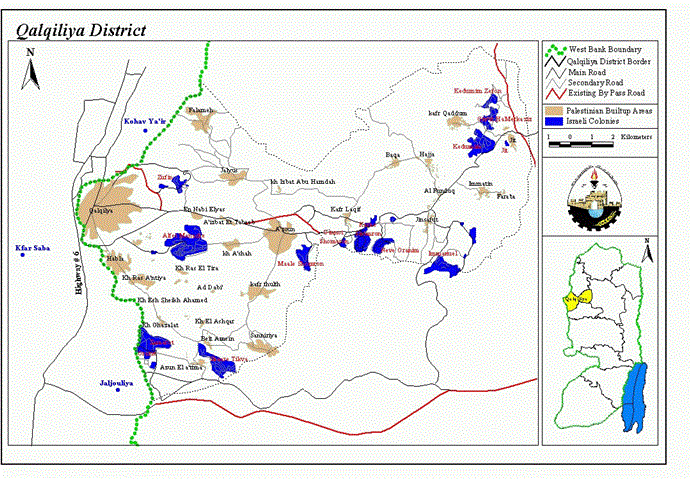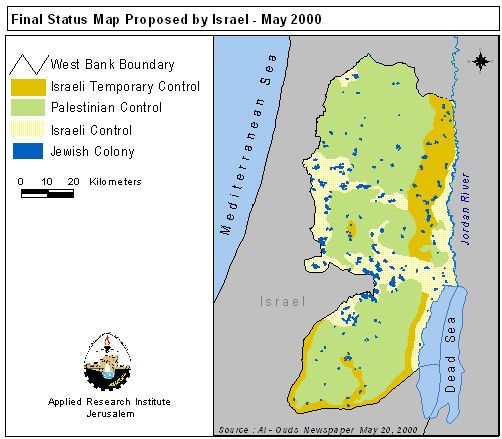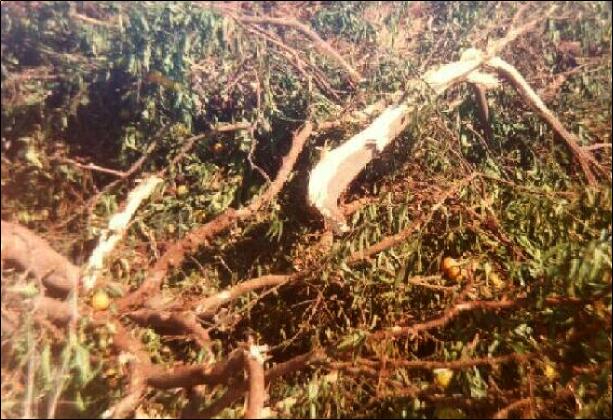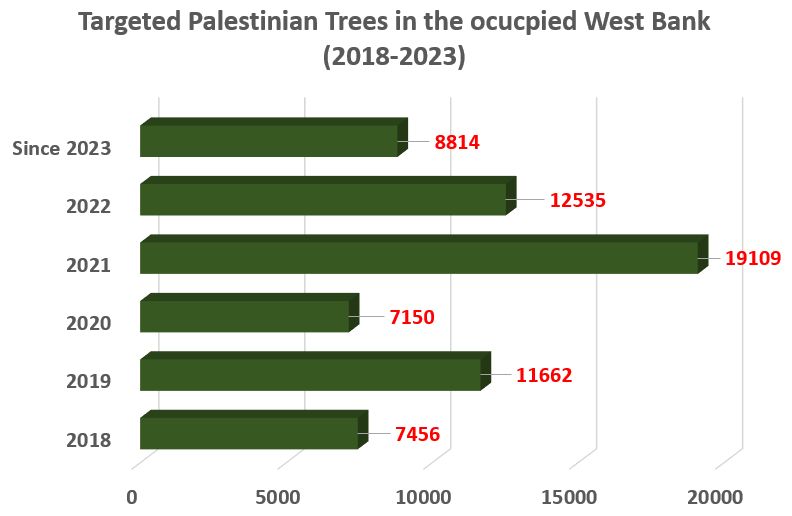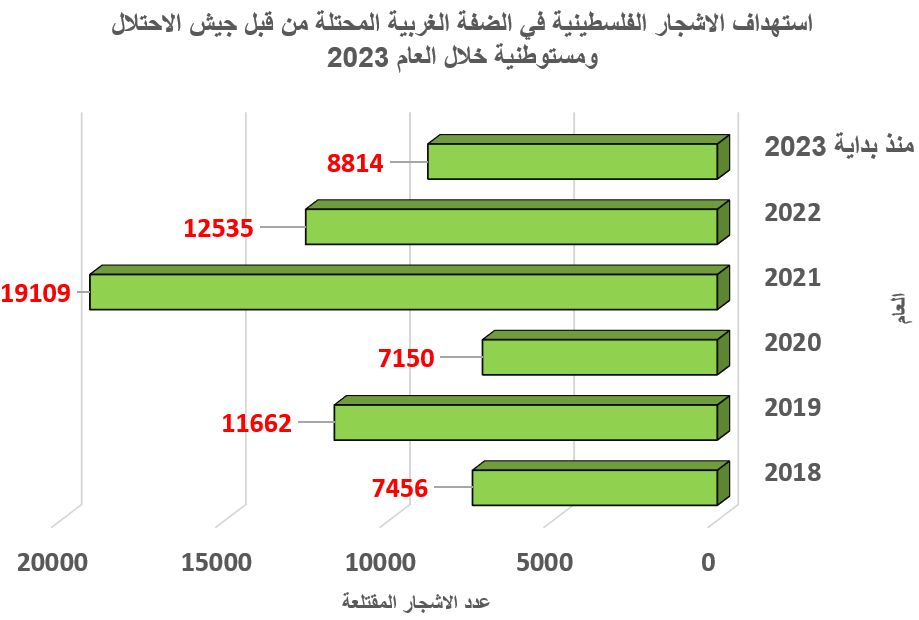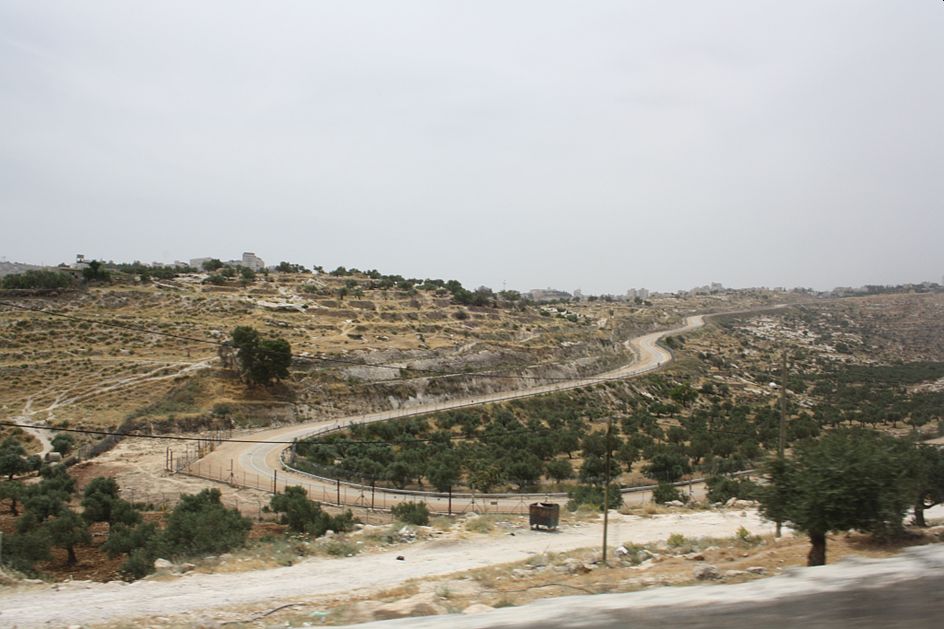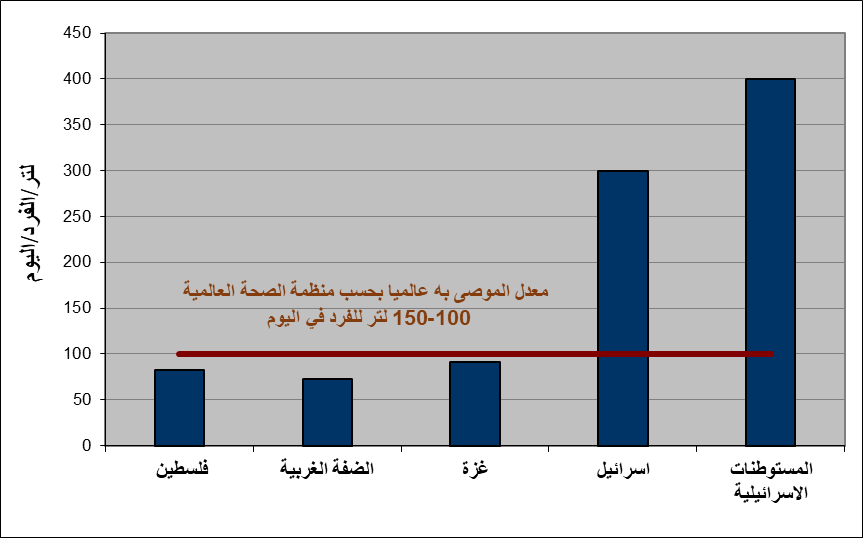The district of Qalqiliya lies in the northwest part of the West Bank, bordered in the west by the 1948 Armistice Line with Israel; see map1 . Most of the district lies within a fertile soil zone and agriculture represents a large percentage of its economy. It also has a higher population density than many other West Bank districts. These characteristics are a result of the western groundwater basin, which underlies the district. This groundwater basin is shared between the Palestinians and the Israelis. However, the vast majority of its capacity is used by the Israelis, both in Israel and in the Jewish settlements in the West Bank. Palestinian water consumption accounts for only about 6% of the total amount of water used from the western groundwater basin.
The fertility of this area and its abundant water resources make it highly desirable to the Israelis in Final Status negotiations. Israel also claims security interests. The western edge of the Qalqiliya district is only about 13 kilometers from the Mediterranean coast of Israel. The Israeli government claims this strip of land is too narrow and threatens the state with being split in two in a time of war. In May 2000 the Israeli government presented how they foresee the future of the West Bank in a Final Status map. By superimposing the Qalqiliya district border on the map it is evident that such a plan would absorb almost the entire district into Israel; see map 2. .
Other developments affirm Israel's interest in annexing the area; click for more. The western edge of the West Bank has long been one of the main areas of Jewish settlement construction. This strategy alters the demography in such a way as to make it more and more difficult to return this land to the Palestinians when the Final Status borders are drawn. Another clue to Israel's plans for the future of the area is highway #6, build right along the edge of the 1949 Armistice Line, and at a lower elevation than the land immediately on the West Bank side of the border; see map 1. It seems doubtful that the Israeli government, with its high concern with security, would build a main highway and leave it permanently in such a vulnerable spot along the border of a future Palestinian state.
The day-to-day methods that the Israeli occupation uses to work toward these long-term plans in Qalqiliya are the same they use throughout the West Bank and Gaza, including land confiscation , destruction of personal property, restriction of movement, and daily harassment. The effect of the occupation is the strangulation of Palestinian communities. Nowhere is this more evident that in the agricultural sector of the Palestinian economy, particularly since the beginning of the Al Aqsa intifada. The Qalqiliya district is heavily dependent on agriculture and its farmers have been hit hard by the occupation in recent months, as shown in the following tables.
Direct Losses to Agriculture in Qalqiliya District … October 2000-January â??2001
Direct losses to Palestinian agriculture include the confiscation and destruction of private property, including greenhouses, nurseries, farm equipment, irrigation systems, orchards, and field crops; see photo1. Both the Israeli Civil Administration (military government) and the Israeli settlers carry out these acts of destruction on a regular basis. For a complete list of the direct damage done to Palestinian farmers . Both the Israeli Civil Administration (military government) and the Israeli settlers carry out these acts of destruction on a regular basis. For a complete list of the direct damage done to Palestinian farmers see Table 1.
Table 1: Direct Agricultural Losses in Qalqiliya District, October 2000 – January 2001
|
Number |
Farmer Name |
Village |
Type of Damage |
Size of Loss |
Amount of loss (in $) |
Date of Incident |
|
1 |
*Atah Abdel Karim |
Qalqiliya |
Destroyed nursery |
N/A* |
60,000â? |
October 23, 2000 |
|
2 |
Abdel kader Walwil |
Qalqiliya |
Bulldozed 200 citrus trees and olive trees |
5 dunumâ?¡ |
29,000 |
October 31, 2000 |
|
3 |
Mohammed Sa'id Al-Salem |
Habla |
Bulldozed 20 citrus trees |
0.5 dunum |
2,000 |
November 4, 2000 |
|
4 |
Abedallah Ahmed Al-Raâ??I |
Habla |
Destroyed Irrigation system on the way to Habla |
|
250 |
November 4, 2000 |
|
5 |
Shaker Jamos |
Habla |
Bulldozed 30 rough lemon trees |
1 dunum |
750 |
November 4, 2000 |
|
6 |
*Mershed Sliman |
â??Isla |
Bulldozed 280 10-15 year-old olive trees |
30 dunum |
28,000 |
November 7, 2000 |
|
7 |
Mohammed Abdel Raheem Da'oud |
Qalqiliya |
Land bulldozed which contained 150 citrus trees, one olive tree. Destroyed an irrigation system and a fence |
4 dunum |
19,000 |
November 9, 2000 |
|
8 |
Hussni Hasan Mohammed Al-Suqi |
'Izbat Salman |
Vegetation bulldozed. Destroyed irrigation system and uprooted 100 rough lemon trees |
1dunum |
2,875 |
November 12, 2000 |
|
9 |
Basem Abdel Atif Ja'edi |
Qalqiliya |
Demolished an agriculture room with its equipment and a 15 meter irrigation pipe |
0.5 dunum |
2,500 |
November 12, 2000 |
|
10 |
Yaser Nazal Al-Harash |
Qalqiliya |
Destroyed vegetables and irrigation system |
1 dunum |
1000 |
November 12, 2000 |
|
12 |
Munther Mohammed Hasan Zeid |
Qalqiliya |
Destroyed 6 inch diameter water pipe (6 inch diameter, 100 meters long) |
100 meter pipe |
250 |
November 14, 2000 |
|
13 |
Rasheed Mohammed Qa'mar |
Qalqiliya |
Bulldozed ornamental trees and oak trees |
2 dunum |
100,000 |
November, 14 2000 |
|
14 |
Taghred Adel Ass'ad |
Habla |
Bulldozed 70 citrus trees and destroyed irrigation pipe (4 inch diameter, 60 meters long ) |
2 dunum and 60 meter pipe |
8,000 |
November 17, 2000 |
|
15 |
Mohammed Sa'id Saleh Aqra' |
Qalqiliya |
Over 2 donkeys killed as a result of gas |
|
430 |
November 19, 2000 |
|
16 |
Kaied Abdel Karim 'Atah |
Qalqiliya |
Bulldozed nursery and green houses with seedlings |
6 dunums in two locations |
75,000 |
November 21, 2000 |
|
17 |
Kaied Abdel Karim â??Atah |
Qalqiliya |
Bulldozed nursery with seedlings and other buildings |
4 dunums |
300,000 |
November 21, 2000 |
|
18 |
*Mou'in Abdel Karim 'Ata |
Qalqiliya |
Bulldozed land and nurseries |
4 dunums |
248,000 |
November 21, 2000 |
|
19 |
Mohammed Mahmoud Saleh Da'oud |
Qalqiliya |
Bulldozed nursery with seedlings and other buildings |
7.5 dunums |
321,250 |
November 21, 2000 |
|
20 |
Tahseen Shareef Yousef Ishreim |
Qalqiliya |
Bulldozed nursery with seedlings and other buildings |
5 dunums |
125,000 |
November 21, 200 |
|
21 |
Hussein Abdel Jabbar 'Eid |
Jinsafut |
Opened new 2.5 km bypass road (8-10 meter width) to colony. Uprooted 15 olive trees and 14 forest trees |
N/A |
4,000 |
November 22, 2000 |
|
22 |
Rashad Ahmad Salmi |
Qalqiliya |
Damaged 50 meter fence |
.5 dunum |
500 |
November 25, 2000 |
|
23 |
Yasser Sa'ed Al-Sa'ou |
Qalqiliya |
Destroyed vegetables and uprooted 50 rough lemon trees along with fence around the trees |
2 dunums |
1,250 |
November 25, 2000 |
|
24 |
Sa'ed Titan |
Qalqiliya |
Destroying coulifower field |
.5 dunum |
250 |
November 25, 2000 |
|
25 |
*Wajeeh Mohammed Samy |
Qalqiliya |
Demolished agriculture room and farm equipment |
N/A |
2,000 |
November 25, 2000 |
|
26 |
*Mo'in â??Ata |
Habla |
Damging nursery |
1 dunum |
2,250 |
November 26, 2000 |
|
27 |
Hussein Abdel Jabbar 'Eid |
Jinsafut |
Opened bypass road uprooting 30 olive trees |
N/A |
6,000 |
November 30, 2000 |
|
28 |
Hamed Ahmad Mohammad 'Adwan |
'Azzun |
Destroyed fence around orchard and cut branches. Stole fruit |
2 dunums |
500 |
December 3, 2000 |
|
29 |
Abdel Qader Mahmoud Abdel Halim Riyan |
Kafr Qaddum |
Stole 16 sacks of olives each containing 50 kilo |
900 kilograms of olives |
1,000 |
December 4, 2000 |
|
30 |
Munther Hasan Zeid |
Qalqiliya |
Destroyed water pipe (6 inch diameter, 100 meters long) |
100 m |
250 |
December 4, 2000 |
|
31 |
*Ahmad Abdel rahman Quzmar |
'Izbat Salman |
â?? Uprooted 240 12-15 year-old olive trees â?? Uprooted 25 15 year old fruit and almond trees â?? Uprooted 50 20year-old calamantina trees |
250 dunums total |
â?? 48,000 â?? 2,500 â?? 5,000 |
December 12, 2000 |
|
32 |
Abdel Latif Noufel |
Qalqiliya |
Bulldozed a nursery at the northern entrance to Qalqiliya city and destroyed greenhouse and agriculture room with seedlings. The nursery destroyed for 3rd time |
3 dunums |
112,225 |
December 13, 2000 |
|
33 |
Fahd Abdel Rahim Khleif |
An Nabi Elyas |
Destroyed water pipe |
20 meters |
150 |
December 19, 2000 |
|
34 |
Riyad Amin Abdel Rahman Hourani |
Qalqiliya |
Destroyed ceramic and plastic containers |
1 dunum |
3,750 |
December 21, 2000 |
|
35 |
Taysir Mohammad 'Ali Abdel Fattah Da'oud |
Qalqiliya |
Destroyed ceramic containers with seedlings and a water tank |
1 dunum |
3,625 |
December 21, 2000 |
|
36 |
Ahmad Rashad Zeid |
Qalqiliya |
Bulldozed land with vegetables and fence |
.5 dunum |
1,000 |
December 31, 2000 |
|
37 |
Hasan Yousef Ishreim |
Qalqiliya |
Destroyed ceramic |
N/A |
5,000 |
December 31, 2000 |
|
38 |
Isam Abdallah 'Omar Salim |
'Azzun |
Destroyed livestock farm |
N/A |
5,000 |
December 31, 2000 |
|
39 |
Naif Abdel Qader 'Awad Jabr |
Kafr Laqif |
Bulldozed olive trees |
N/A |
5,000 |
December 31, 2000 |
|
40 |
Ahmad 'Ali Qadoura |
Kafr Laqif |
Bulldozed olive trees |
N/A |
5,000 |
December 31, 2000 |
|
41 |
'Adel AbdelJawad Daâ??as |
Immatin |
Bulldozed olive trees |
N/A |
2,500 |
December 31, 2000 |
|
42 |
Da'ouid 'Ali mahmoud Salem |
Qalqiliya |
Bulldozed olive trees and detroyed greenhouse |
N/A |
3,500 |
December 31, 2000 |
|
43 |
'Adel Yousef Mohammad Hardan |
Qalqiliya |
Destroyed greenhouses |
N/A |
800 |
December 31, 2000 |
|
44 |
Ma'azouz Abdel Rahim Da'oud |
Qalqiliya |
Bulldozed full grown trees and irrigation system |
N/A |
19,000 |
December 31, 2000 |
|
45 |
Mahmoud Abdel Rahman Quzmar |
'Izbat Salman |
Bulldozed olive trees |
N/A |
1,500 |
December 31, 2000 |
|
46 |
'Ali Ghaleb 'Ali Salmy |
Qalqiliya |
Destroyed ceramic and plastic containers with seedlings |
N/A |
2,000 |
January 10, 2001 |
|
47 |
Wa'el Ahmad Moustafa Al-'Adl |
Qalqiliya |
Damaged ceramic and plastic containers with seedlings, and damaged rainwater gathering channel |
N/A |
2,250 |
January 10, 2000 |
|
48 |
Mohammad Abdel Rahim Hussein Sameek |
Qalqiliya |
Damaged cement containers and seedlings |
N/A |
2,750 |
January 10, 2000 |
|
49 |
Ahmad Mohammad Ahmad Farraj |
Qalqiliya |
Damaged ceramic and plastic containers with seedlings and electricity network |
N/A |
13,000 |
January 10, 2000 |
|
50 |
Mazen 'Ali Hasan Da'oud |
Qalqiliya |
Damaged ceramic and plastic containers with seedlings |
N/A |
1,750 |
January 10, 2000 |
|
51 |
Gkadra Abdel Qader Hindi |
Qalqiliya |
Uprooted trees, destroyed irrigation pipes |
4 dunums |
4,000 |
January 11, 2000 |
|
52 |
'Omar Mahmoud Swelem |
Qalqiliya |
Damaged irriagtion network and plastic containers by bombs |
2 dunums |
500 |
N/A |
|
53 |
Abdel Rahman Yousef Al-Aqra' |
Qalqiliya |
Damaged ground well and electric motor |
N/A |
14,300 |
January 11, 2000 |
|
54 |
Majed Abdel Rahim Abdallah |
Jayyus |
Uprooted citrus trees |
N/A |
2,500 |
January 27, 2000 |
|
55 |
Raouhi Ahmad Sweiki |
Jinsafut |
Uprooted 15 olive trees |
N/A |
1,500 |
January 30, 2000 |
Total Losses 1,609,405
* Not Available
According to the UN Special Coordinator for the Occupied Territories, the per capita income in the Occupied Territories in the year 2,000 is estimated at USD 1,680. (UNSCO report: ''The Impact on the Palestinian Economy of Confrontations, Mobility Restrictions and Border Closures, 1, October 2000 â?? 31, January 2001'').
4 dunums = 1 acre
Total worth of direct losses to farmers in Qalqiliya district from October, 2000 to January 2001: $1,609,405
Indirect Losses to Agriculture in Qalqiliya District … October 2000-January â??2001
Indirect Losses in Palestinian agriculture include a number of factors, most of them caused by the closure policy of the occupation. The Israeli military government has set up a network of checkpoints and roadblocks on Palestinian roads, severely limiting their freedom of movement; click for more. For farmers this means that they are either extremely limited or completely prohibited in their ability to transport their crops to the markets, whether in neighboring countries or within the West Bank and Gaza. Therefore they sometimes must sell their goods locally at a reduced price. When they do attempt to transport their goods to market they are often forced to take dangerous back roads that extend the length of their journey and damage their produce and vehicles. On top of these costs, the price of feed for animals has risen. In addition, they are at times unable to work their land either because they cannot reach it or because they fear being shot by settlers. The following tables record the financial costs of this damage in the Qalqiliya district from October 2000 to January 2001.
Table 2: Indirect Losses in Plant Production
| Commodity | Losses in US$ |
| Guava | 62,000 |
| Citrus | 698,000 |
| Vegetables | 2,447,200 |
| Olives | 2,927,250 |
|
Nurseries |
304,000 |
| Total | 6,438,450 |
Table 3: Indirect Losses in Animal Production
|
Type |
Commodity |
Losses in US$ |
|
Sheep |
Feed |
120,000 |
|
Milk |
72,000 |
|
|
Lambs |
121,430 |
|
|
Goats |
Feed |
60,000 |
|
Milk |
45,000 |
|
|
Kids |
70,000 |
|
|
Dairy Cattle |
Feed |
43,200 |
|
Milk |
135,000 |
|
|
Calves |
Feed |
43,200 |
|
Milk |
96,000 |
|
|
Chickens |
Broilers |
918,667 |
|
Eggs |
459,000 |
|
|
Chicks |
16,667 |
|
|
Feed for egg production |
90,000 |
|
|
Feed for meat production |
32,500 |
|
|
Bees |
Honey |
35,000 |
|
Total |
2,357,664 |
Table 4: Other Indirect Losses
|
Type |
Losses in US$ |
|
Loss of income to drivers |
650,000 |
|
Increase in tax for transportation permits |
18,000 |
|
Loss from halt to agricultural projects |
150,000 |
|
Total |
818,000 |
Total worth of indirect losses to farmers in Qalqiliya district from October, 2000 to January 20001: $9,614,114
Table 5: Total Direct and Indirect Losses to Agriculture in Qalqiliya , October 2000 – January 2001
|
Direct |
1,609,405 |
|
Indirect |
9,614,114 |
|
Total |
11,223,519 |
These figures represent an enormous loss to the Palestinian farmers and to the overall economy in the Qalqiliya district as a result of the tightening of the closure on the West Bank and Gaza since the beginning of the Al Aqsa intifada. Since the beginning of the peace process the Palestinian economy has experienced a downward spiral as a result of military occupation and the strangulation of their communities. This has undercut confidence in the Israeli government as a legitimate partner for peace, and indeed in the peace process itself. The impoverishment of the Palestinian people does not provide a solid basis for the security of either the Israelis or the Palestinians and must stop if peace negotiations are to succeed in a just settlement.
For more on the impacts of the occupation on the agricultural sector see the following case studies:
*Thanks to the Qalqiliya Department of Agriculture for the above figures.
Prepared by:
The Applied Research Institute – Jerusalem


